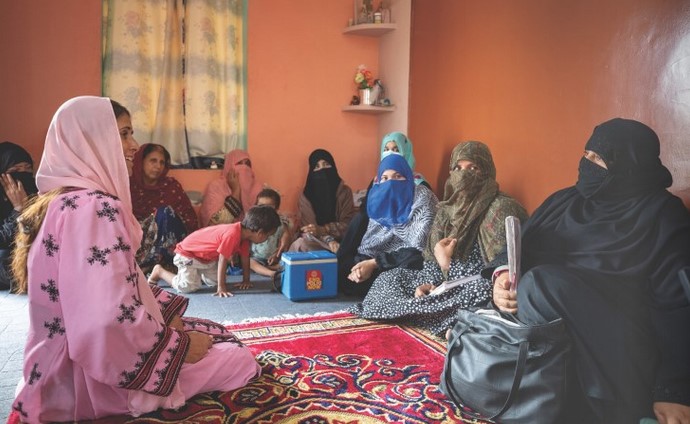Pakistan’s female vaccinators are doing more than helping end a disease.
Women make up two-thirds of Pakistan’s polio workforce. It’s a startling statistic for a nation that ranks 145th out of 146 countries for gender parity in economic participation and opportunity, according to a World Economic Forum gender inequality index.
The role of female vaccinators is born of necessity. Because of cultural norms, men are not allowed into many people’s homes in Pakistan. Women who provide the health care are the key link. They can build mom-to-mom relationships and provide trusted advice on not only polio but other health issues. “Women working with women on the front line is going to be what gets us across the finish line,” says Rotary President Jennifer Jones, who met last year with polio workers in Pakistan. The country and Afghanistan are the only two where wild poliovirus is still transmitted persistently. The female vaccinators’ work is neither safe nor easy. The women in Pakistan are sworn at, shoved, beaten, and some even killed. They’re fighting misinformation. But their work is crucial — and not just for the cause of polio eradication.
“They are supporting their education, they’re supporting their household, they’re supporting their men and giving a change in Pakistan,” says Sadia Shakeel, coordinator for a Rotary-supported polio resource center in Karachi. “This is bigger than polio.” Shakeel calls them “little entrepreneurs.” Most of the women range in age from 21-38 and have their own children, she says. Yet they wake to say prayers before dawn, feed their children breakfast, and leave to start their work to end a disease.
Employing women is one key strategy of the Global Polio Eradication Initiative. And that’s not just to deliver the vaccines at the front line; it’s also to hire women as supervisors, doctors, and decisionmakers. “We cannot succeed without the women we have in the program at all levels,” says Hamid Jafari, a pediatric infectious disease doctor and director of polio eradication for the World Health Organization’s Eastern Mediterranean region.
Rotary Norden 3_2023
